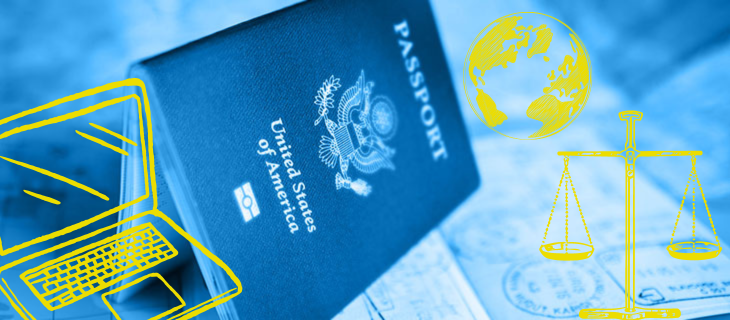Digital Nomad Visas vs. Golden Visas: Which is Right for You?

With so many different visas available, it can be difficult finding the one that is right for you to move abroad. If you’re a remote worker or retired earning a pension, you may be considering digital nomad visas vs. golden visas as options.
While both of these visas may be suitable for those earning income remotely, whether it’s passive or active, there are stark differences between digital nomad visas vs. golden visas.
Applying for a visa to move abroad is a serious decision and requires a lot of research. That’s why Nomads Embassy has made it easy to review visa requirements and application processes, so you can make a more informed decision.
In this article, we’ll explore the differences between digital nomad visas vs. golden visas and how to decide which visa is right for your goals and situation.

What is a Digital Nomad Visa?
Let’s first discuss the details of a digital nomad visa and exactly what it is.
A digital nomad visa allows remote workers and their families to temporarily reside in a foreign country while working remotely.
It’s important to note that this does not give the applicant the right to seek local employment in their new country of residence.
These digital nomad visas can often be renewed, with the average visa term being between 12 months and three years.
Who is Eligible for a Digital Nomad Visa?
The basic requirement for digital nomad visas is that the applicant must work remotely and meet the proposed income requirement set by the issuing country.
It will be important that the applicant can prove their income on their digital nomad visa application through bank statements or payslips.
Many digital nomad visas will also require a clean criminal record and international health insurance policies.
Most digital nomad visas do not have specific requirements about how applicants earn their income remotely. They can work as remote employees, freelancers, or business owners.
However, some countries, such as Seychelles, require applicants to be remote employees or freelancers. Thailand requires applicants to be remote employees. And Malaysia requires applicants to work in the digital domain.

What Countries Offer a Digital Nomad Visa?
The concept of a digital nomad visa is fairly new, with Estonia being the first country to introduce it in 2020.
Currently, there are over 30 countries that offer digital nomad visas worldwide.
There are digital nomad visas available in Europe, the Caribbean, Africa, South America, Central America, and Southeast Asia.
More digital nomad visas are expected to become available in the coming months.
To stay up to date with the latest digital nomad visa news, you can join our newsletter.
Do Digital Nomad Visas Require a Minimum Income?
The majority of digital nomad visas do require applicants to meet a minimum income requirement. Oftentimes, this minimum income requirement is based on the country’s national minimum wage and multiplied by three or four.
However, there are a handful of digital nomad visas that do not require a minimum income from applicants. Even though there is no set amount, authorities can still ask to see bank statements to prove that you can support yourself, though.
Can You Apply for a Digital Nomad Visa as a Family?
Some digital nomad visas allow applicants to include immediate family members, such as spouses and children under 18 years old.
Applying for a digital nomad visa as a family could cause the minimum income requirement to increase with each additional member.
It’s important to note that family members may not be able to work in the country. However, children may attend local schools.

Can a Digital Nomad Visa Lead to Permanent Residency or Citizenship?
Some digital nomad visas can lead to permanent residency, which is ideal for families who want to move abroad and set up a new life. After obtaining permanent residency, many countries will allow citizenship by naturalization.
The most popular digital nomad visas that lead to permanent residency include Portugal, Greece, and Spain.
Typically, you will have to live in the country consistently for at least five years and be a tax resident to apply for permanent residency.
Who is the Ideal Digital Nomad Visa Applicant?
A digital nomad visa is ideal for those who work remotely as either an employee, freelancer, or business owner and what to temporarily live abroad.
While some digital nomad visas lead to permanent residency, the majority offer only temporary residence. So, if you are looking for a quick adventure or some time away abroad without worrying about overstaying a tourist visa, then a digital nomad visa is ideal for you.

What is a Golden Visa?
A golden visa is a unique opportunity for entrepreneurs, retirees, and wealthy individuals. To put it simply, golden visas offer residency or citizenship abroad in exchange for an investment.
This investment can be in real estate, bonds, stocks, funds, businesses, or a flat tax rate. The qualifying investment requirements and amounts differ depending on the country offering the golden visa.
A golden visa doesn’t necessarily have the same overall ideal as a digital nomad visa. They can vary greatly depending on the benefits, requirements, and investment amounts.
Who is Eligible for a Golden Visa?
The eligibility requirements for a golden visa are much broader than a digital nomad visa. The main requirements are that the applicant is at least 18 years old, can make the necessary investment, and is of good character.
The applicant must prove they have obtained their funds and financial history legally too.
The ideal applicant for a golden visa is a wealthy individual, retiree, or entrepreneur.
What Countries Offer Golden Visas?
There are currently 19 countries that offer golden visas worldwide. Unfortunately, a handful of countries have decided to drop their golden visa programs, such as Ireland, Portugal, and the UK, due to unexpected results.
If you are considering investing abroad and applying for a golden visa, then we recommend moving quickly as these programs don’t last forever.

Do Golden Visas Require a Minimum Income or Investment?
Unlike digital nomad visas, golden visas often require a minimum investment to be eligible to apply.
The amounts of these minimum investments vary greatly. For example, Vanuatu’s citizenship program requires an investment of $130,000, while Austria requires a €10 million investment.
These investments could be in the form of acquiring real estate, investing in specific funds, donating to the country, buying stocks or bonds, and opening or funding a local business.
It’s important to note that the investment amounts could increase at any given moment. For example, Greece is increasing its real estate investment option from €250,000 to €500,000 this year.
Do Golden Visas Allow Family Inclusion?
Yes, many golden visas allow applicants to include their immediate family members and sometimes even extended members, such as dependent parents or grandparents.
Family members will often receive the same benefits as the main applicant and have the right to work, live, and study in the country.

Do Golden Visas Lead to Permanent Residency or Citizenship?
The purpose of a golden visa is to obtain permanent residency or citizenship. While there are only a handful of golden visas that grant direct citizenship, oftentimes, permanent residents can apply for citizenship through naturalization.
Some of the most popular citizenship-by-investment programs include Vanuatu, Turkey, and St. Lucia.
It is rare that a golden visa leads to only a temporary residence permit, but it is not unheard of.
In many cases, to retain residency or citizenship through a golden visa, the applicant must spend a certain amount of time in the country each year. This could be anywhere from one day to six months, depending on the country.
Who is the Ideal Applicant for a Golden Visa?
The ideal applicant for a golden visa is someone who is looking to diversify both their financial assets and lifestyle.
Obtaining a second passport or residency can be a strategic way to protect wealth, decrease tax rates, and have a second home in the world for the applicant and their family members.
Golden visas are ideal for wealthy individuals, retirees, or entrepreneurs looking to globalize their lifestyles. While the investment requirement may be hefty, there are great benefits to being a citizen of the world.

Are Golden Visas a Good Option for Digital Nomads?
Now that we know the differences between digital nomad visas vs. golden visas, it’s time to determine which one is best for you.
If you are a digital nomad interested in moving abroad, you may be considering a golden visa. However, unless you are able to make the required investment and commit to the minimum stay requirement, a golden visa may not be the right choice for you.
The digital nomad lifestyle is often one where the remote worker moves around quite often. So, staying in a country for six months out of the year could interfere with their adventurous hearts.
For digital nomads who want to simply experience living abroad temporarily while working remotely and not have to worry about the bureaucracy of getting permanent residency or paying serious taxes, a digital nomad visa could be the better option.
Why Were Digital Nomad Visas and Golden Visas Created?
While the requirements for the digital nomad visas vs. golden visas are fairly different, the reason they were both created is the same.
Ultimately, these visas were created to benefit the issuing country’s economy.
When a digital nomad lives abroad working for a company in a different country, but spending their salary abroad, it boosts the foreign country’s economy.
The same goes for golden visas. The large investment from golden visa applicants gives a huge boost to the local economy. Plus, when the applicant lives there, they spend money on groceries, utilities, and more, further contributing to the economy.

The True Difference Between Digital Nomad Visas vs. Golden Visas
The true differences between these two visas are the ultimate outcome goals and eligibility requirements.
A digital nomad with a remote job earning a salary and looking to invest in experience would benefit from a digital nomad visa.
For digital nomads who are entrepreneurs or would consider themselves to be wealthy individuals who would like to permanently diversify their lifestyle with a second residency or passport, a golden visa could be a better option.
All-in-all, the ultimate decision depends on your personal situation and goals. What we can do here at Nomads Embassy is give you the resources to make an informed decision.
Legally Move Abroad with Nomads Embassy
Moving abroad and applying for any kind of visa is complicated and overwhelming. Nomads Embassy: The World’s First Embassy for Digital Nomads has made it easier than ever to apply for digital nomad visas worldwide.
We have partnered with hand-selected local immigration lawyers to assist our members with their visa applications and relocation abroad.
Plus, we’ve built a secure and innovative platform to keep all of your documents in one safe place for your lawyer to review.
Are you ready to apply for a digital nomad or golden visa?
Request a free digital nomad visa eligibility check to determine which visa is right for you!
You may also enjoy

A new digital nomad visa has popped up for remote workers… but it’s not like traditional remote worker visas we’ve talked about before. Launched in February 2026, the Bhutan digital…
by Brittany

Do you dream of living and working remotely from Sri Lanka for a year? See if you can with our free Sri Lanka digital nomad visa eligibility check! Simply answer…
by Brittany

Are you planning to apply for the Portugal digital nomad visa? Then you’ll want to read about the new eligibility changes and Portugal digital nomad visa updates for 2026. Each…
by Brittany
